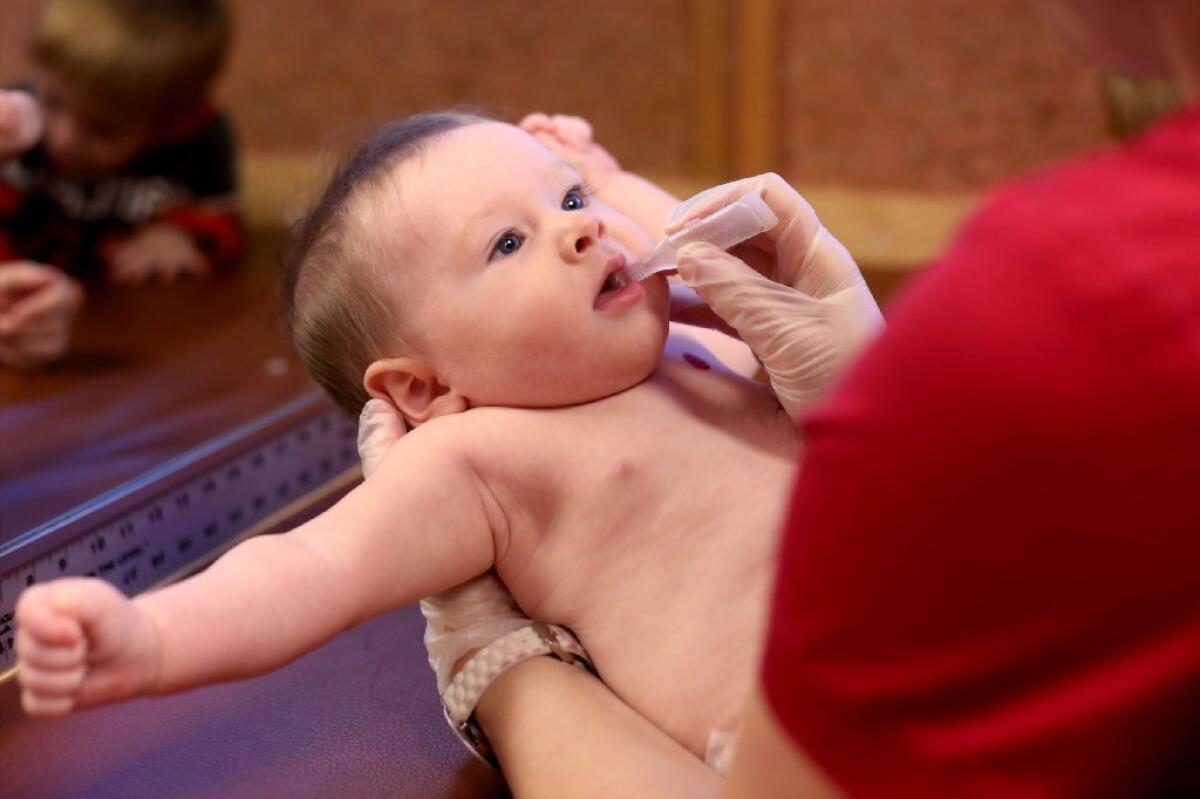Despite safety fears, doctors often delay vaccines for young children

- Share via
Parents aren’t the only ones fretting about vaccines for young children. Trepidation about these routine immunizations has made doctors upset too, a new survey shows.
Fully 92% of pediatricians and family medicine physicians agree that it is important for kids to get vaccinated against measles, diphtheria, pertussis and a host of other diseases, and to get their immunizations on time, according to a study published Monday by the journal Pediatrics. In addition, 87% of the doctors agreed that when parents delay some or all of these vaccines, they are putting their children at risk of being sickened by a preventable disease.
Yet 37% of the doctors who took the survey said they “always” or “often” comply with parent requests to delay vaccination, and another 37% said that they “sometimes” do. Only 26% of the pediatricians and family medicine doctors said they “rarely” go along with these requests.
These figures are based on the responses of 451 doctors who were recruited by the American Academy of Pediatrics and the American Academy of Family Physicians to share their feelings about vaccine issues in 2012. These doctors work all over the country in a variety of practice settings, and their survey answers are thought to be representative of their peers nationwide.
If parents follow all of the recommendations from the Centers for Disease Control and Prevention and the Advisory Committee on Immunization Practices, their children would get roughly two dozen vaccines by the time they are 2 years old.
For a growing number of parents of children under 2, that just seems like too many vaccines too soon. So they are asking their children’s doctors to “spread out” these immunizations, which the study authors defined as “postponing one or more vaccines with the intent of receiving them later.”
The survey revealed that 93% of doctors got at least one such request from a parent in a typical month, and 21% of doctors fielded such requests from at least 10% of the parents in their practices. What’s more, 23% of doctors said the number of these inquiries had increased in the previous year, compared with only 14% who said they had become less common during that time.
These requests are putting real strain on doctors, researchers found. Four in 10 of those surveyed said their job satisfaction had decreased as a result of having to deal with parents who don’t want to follow the official vaccine schedule. Slightly more than one-third of the doctors fretted that by acquiescing to these parents’ desires, they would send a “mixed message” about the value of these vaccines.
Such parents could be quite time-consuming -- 48% of the doctors said they spent at least 10 minutes discussing vaccines with parents who were skeptical about the CDC advice. Those conversations would take up more than half of a typical well-child visit, since these last an average of 18 minutes, the study authors noted. Managing these parents also “created extra work” for 54% of pediatric practices and 37% of family medicine practices, according to the study.
Doctors gave several reasons for being bothered by the idea of delaying some or all vaccines. In addition to the widely shared fear that their patients would become more vulnerable to diseases -- many of which can be life-threatening or result in permanent disability -- 84% felt it was more painful for kids to make extra trips to the doctor for separate shots and 66% worried that the delays would wind up causing unnecessary outbreaks of preventable diseases.
But it’s clear that doctors feel they are caught between a rock and a hard place. Eight in 10 survey takers said they thought vaccine-wary parents would leave their practice if doctors didn’t agree to spread out the immunizations, and 82% felt they needed to comply with the requests in order to “build trust with families.”
The survey results also make plain that doctors don’t know how to use that trust to persuade dubious parents to follow the advice of the medical establishment. Researchers who have been testing messages that might assuage such parents have not had much luck. Indeed, a study published last year in Pediatrics found that when doctors tried to correct parents’ false impressions about vaccines, these parents actually became less likely to get their children immunized.
Still, 23% of pediatricians and 10% of family medicine doctors said they would drop some or all of their patients whose parents insisted on delaying vaccines.
For more medical news, follow me on Twitter @LATkarenkaplan and “like” Los Angeles Times Science & Health on Facebook.







